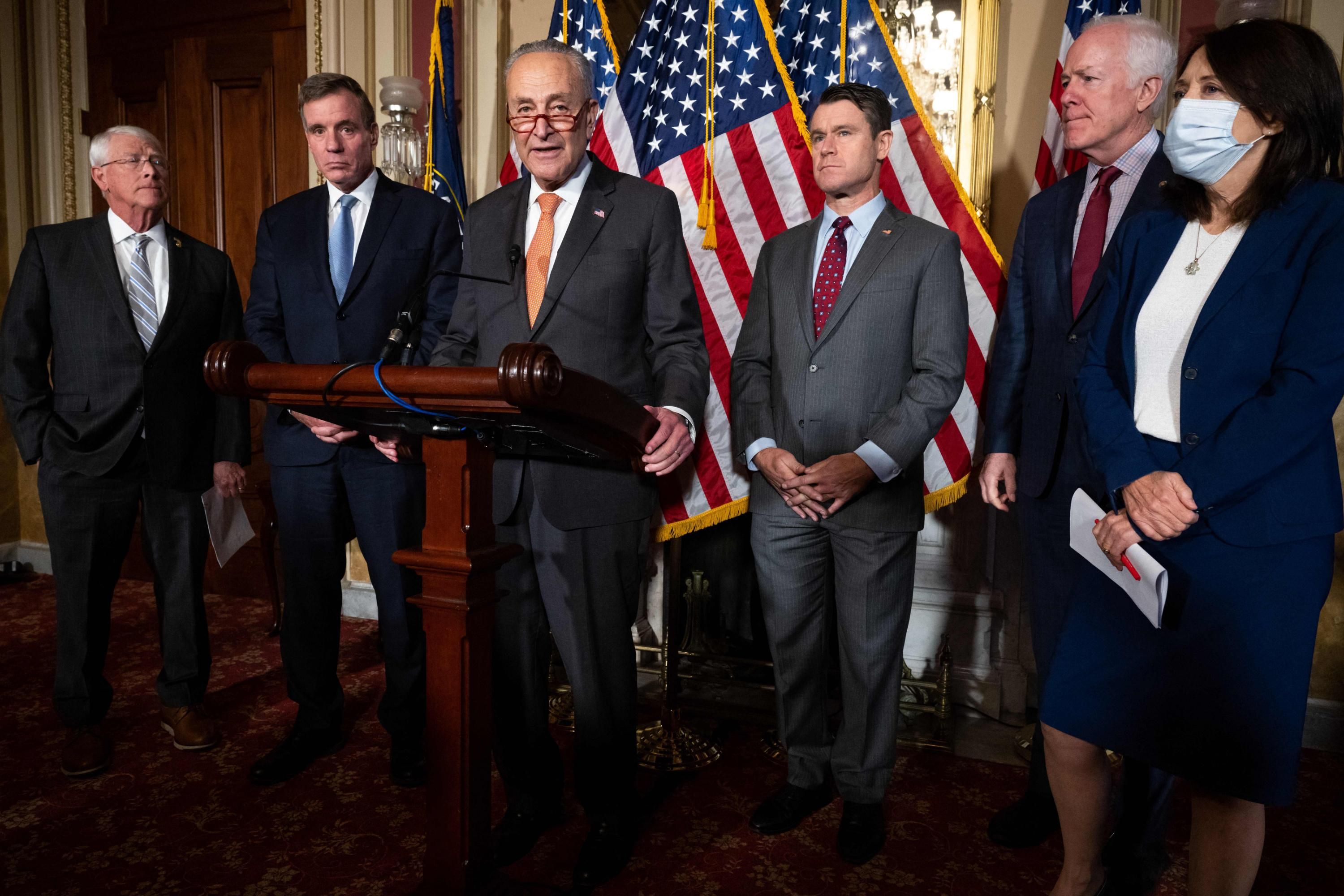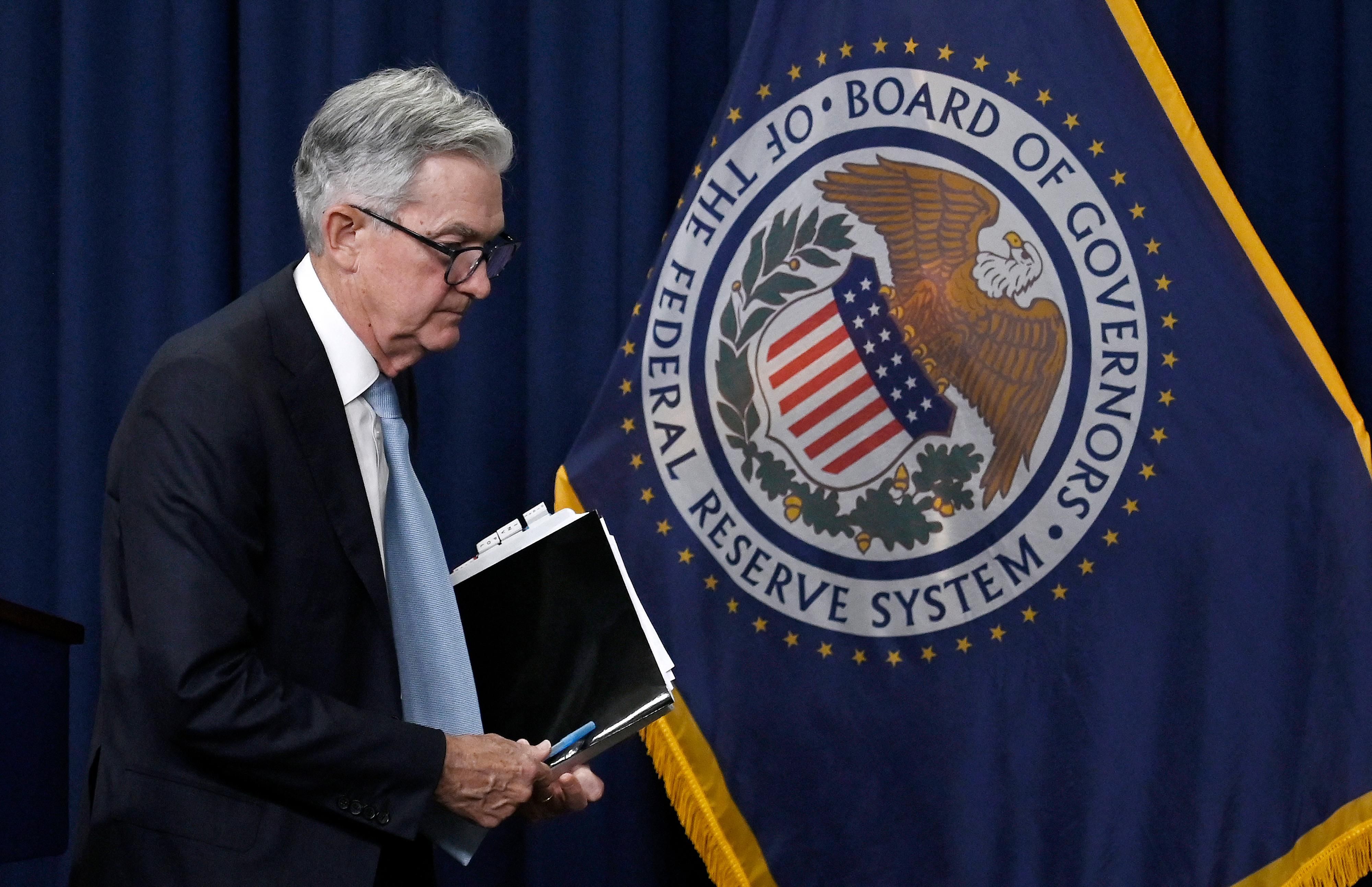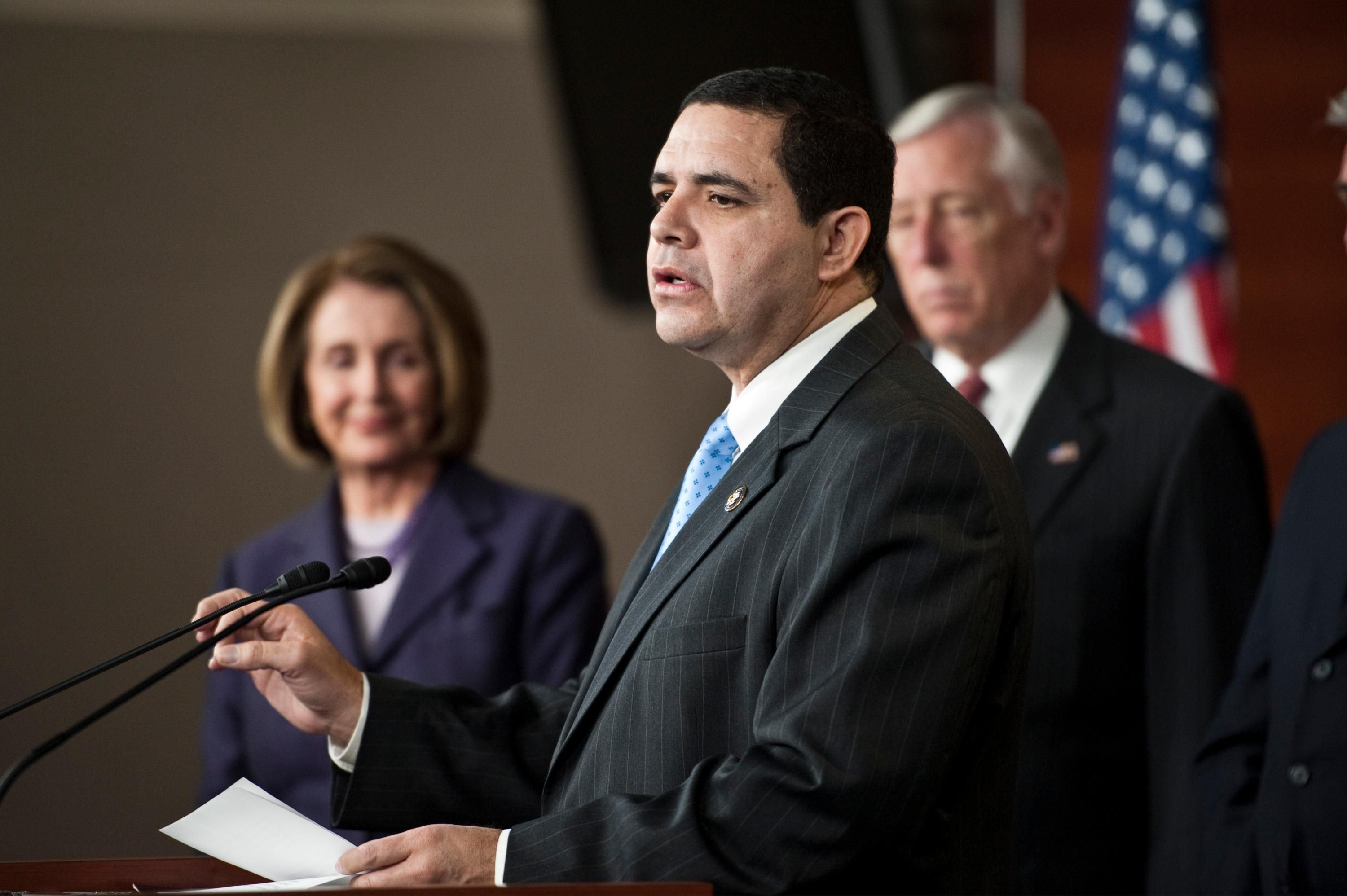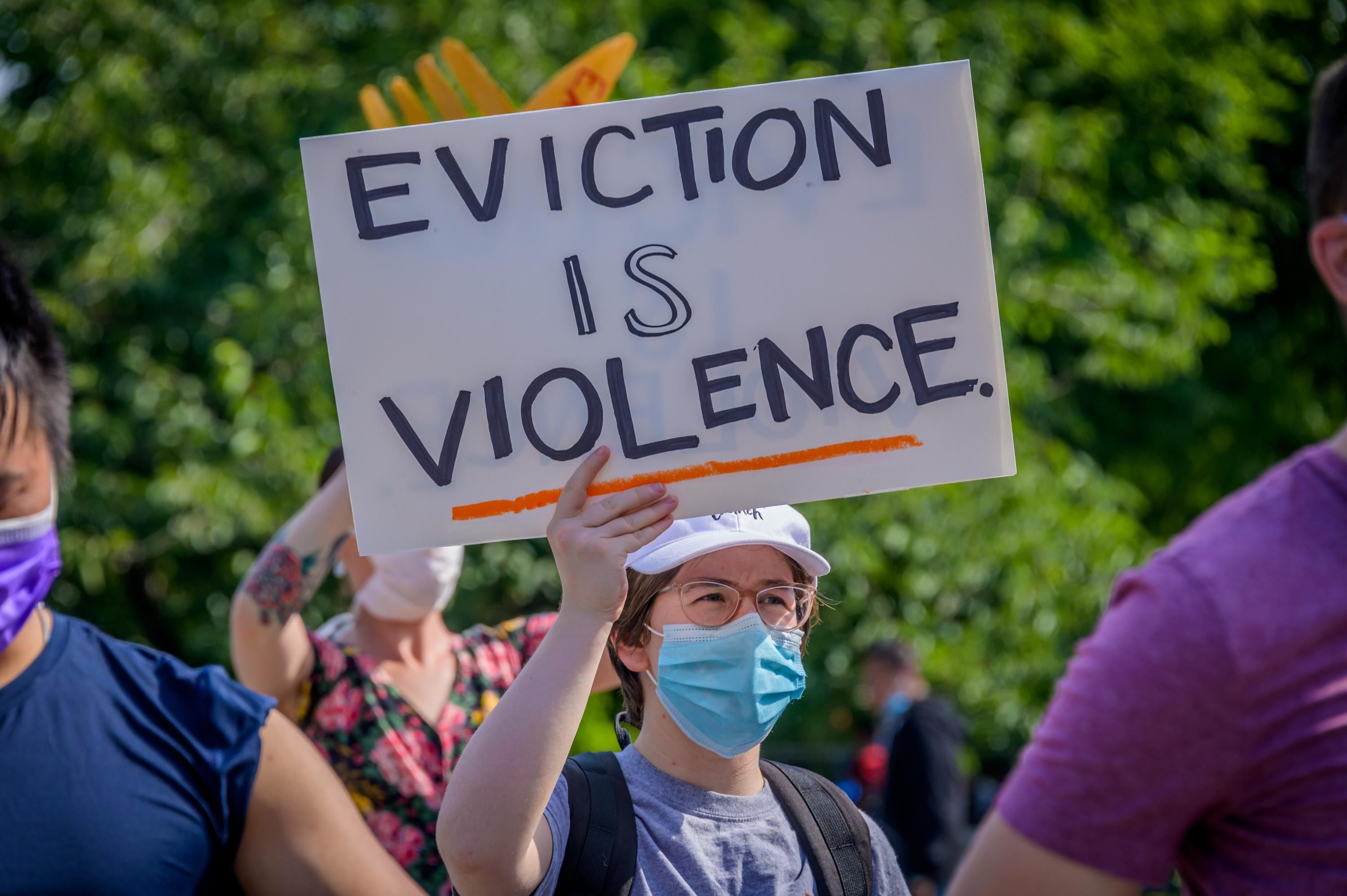Progressives Slam Senate Passage of $76 Billion 'Corporate Giveaway'
"Rather than give aid to needy American families," said one progressive group, "the Senate decided to rise to the occasion to cut taxes for already-profitable technology companies like Intel."

Senate Majority Leader Chuck Schumer (D-N.Y.) speaks alongside a bipartisan group of senators following passage of the CHIPS Act on July 27, 2022. (Photo: Saul Loeb/AFP via Getty Images)
JAKE JOHNSON
In a statement following the bill's passage, Morris Pearl, the chair of the Patriotic Millionaires, said that "after months of paralysis on Build Back Better, today the Senate finally took action."
"But rather than give aid to needy American families... the Senate decided to rise to the occasion to cut taxes for already-profitable technology companies like Intel," said Pearl. "I'm sure this is great for billionaires like [Intel co-founder] Gordon Moore, but it doesn't do a thing for millions of Americans who need support in these challenging economic times. And it won't do much to encourage companies to invest in chip fabrication—Intel is already building chip factories as fast as they can."
As Recode's Rebecca Heilweil wrote Wednesday, "while its biggest champions have connected the CHIPS Act to the ongoing chip shortage, the legislation won't really help, at least in the short term."
"The chip factories produced by this package won't be complete for years, and the bulk of the funding won't necessarily go toward basic chips, also known as legacy chips, which account for much of the ongoing shortage," Heilweil explained. "And that shortage may be nearing its end anyway."
Echoing Sanders, Pearl said that "there are so many things that our government could do to decrease the gross inequality that is spreading like a cancer in our nation; it is hard for me to believe that they want to run for reelection with a platform of giving tax breaks to some of the biggest and most successful companies in our nation."
"Congress should be ashamed," he added, "to pass this corporate giveaway after a year of complete failure to do anything whatsoever for needy American families."
Our work is licensed under Creative Commons (CC BY-NC-ND 3.0). Feel free to republish and share widely.
JAKE JOHNSON
July 27, 2022
The U.S. Senate on Wednesday passed sweeping bipartisan legislation that Sen. Bernie Sanders and progressive advocacy groups decried as a massive giveaway to corporations such as Intel, whose CEO has been lobbying aggressively in support of the bill's subsidies for the profitable microchip industry.
"Congress should be ashamed to pass this corporate giveaway after a year of complete failure to do anything whatsoever for needy American families."
Known as the Creating Helpful Incentives to Produce Semiconductors (CHIPS) Act, the $280 billion legislation is purportedly an attempt to bolster domestic manufacturing and alleviate the U.S. shortage of microchips, which are used in cars, phones, medical equipment, and other everyday electronic devices.
Intel congratulated the Senate on its vote, hailing it as a step toward advancing "American leadership in semiconductor manufacturing" and strengthening "American national and economic security."
But Sanders (I-Vt.) has repeatedly warned that the bill's $52 billion in subsidies for the microchip industry—as well as its $24 billion in tax credits for semiconductor plants—lack safeguards to prevent companies from using the taxpayer money to buy back their own stock, offshore U.S. jobs, or fight unionization efforts.
Sanders was the only member of the Senate Democratic caucus to vote against the bill, which passed by an overwhelming margin of 64-33. The House is expected to follow suit later this week.
In a speech ahead of Wednesday's vote, the Vermont senator reiterated his criticism of the measure, characterizing it as a no-strings-attached handout to profitable companies.
"Whenever it comes to protecting the needs of low-income or working families, I hear over and over again, 'We just cannot afford to do that because of the deficit,'" Sanders said. "All of that profound and serious concern about the deficit fades away when it comes to providing a $76 billion blank check to the highly profitable microchip industry with no protections at all for the American taxpayer."
The U.S. Senate on Wednesday passed sweeping bipartisan legislation that Sen. Bernie Sanders and progressive advocacy groups decried as a massive giveaway to corporations such as Intel, whose CEO has been lobbying aggressively in support of the bill's subsidies for the profitable microchip industry.
"Congress should be ashamed to pass this corporate giveaway after a year of complete failure to do anything whatsoever for needy American families."
Known as the Creating Helpful Incentives to Produce Semiconductors (CHIPS) Act, the $280 billion legislation is purportedly an attempt to bolster domestic manufacturing and alleviate the U.S. shortage of microchips, which are used in cars, phones, medical equipment, and other everyday electronic devices.
Intel congratulated the Senate on its vote, hailing it as a step toward advancing "American leadership in semiconductor manufacturing" and strengthening "American national and economic security."
But Sanders (I-Vt.) has repeatedly warned that the bill's $52 billion in subsidies for the microchip industry—as well as its $24 billion in tax credits for semiconductor plants—lack safeguards to prevent companies from using the taxpayer money to buy back their own stock, offshore U.S. jobs, or fight unionization efforts.
Sanders was the only member of the Senate Democratic caucus to vote against the bill, which passed by an overwhelming margin of 64-33. The House is expected to follow suit later this week.
In a speech ahead of Wednesday's vote, the Vermont senator reiterated his criticism of the measure, characterizing it as a no-strings-attached handout to profitable companies.
"Whenever it comes to protecting the needs of low-income or working families, I hear over and over again, 'We just cannot afford to do that because of the deficit,'" Sanders said. "All of that profound and serious concern about the deficit fades away when it comes to providing a $76 billion blank check to the highly profitable microchip industry with no protections at all for the American taxpayer."
In a statement following the bill's passage, Morris Pearl, the chair of the Patriotic Millionaires, said that "after months of paralysis on Build Back Better, today the Senate finally took action."
"But rather than give aid to needy American families... the Senate decided to rise to the occasion to cut taxes for already-profitable technology companies like Intel," said Pearl. "I'm sure this is great for billionaires like [Intel co-founder] Gordon Moore, but it doesn't do a thing for millions of Americans who need support in these challenging economic times. And it won't do much to encourage companies to invest in chip fabrication—Intel is already building chip factories as fast as they can."
As Recode's Rebecca Heilweil wrote Wednesday, "while its biggest champions have connected the CHIPS Act to the ongoing chip shortage, the legislation won't really help, at least in the short term."
"The chip factories produced by this package won't be complete for years, and the bulk of the funding won't necessarily go toward basic chips, also known as legacy chips, which account for much of the ongoing shortage," Heilweil explained. "And that shortage may be nearing its end anyway."
Echoing Sanders, Pearl said that "there are so many things that our government could do to decrease the gross inequality that is spreading like a cancer in our nation; it is hard for me to believe that they want to run for reelection with a platform of giving tax breaks to some of the biggest and most successful companies in our nation."
"Congress should be ashamed," he added, "to pass this corporate giveaway after a year of complete failure to do anything whatsoever for needy American families."
Our work is licensed under Creative Commons (CC BY-NC-ND 3.0). Feel free to republish and share widely.
















